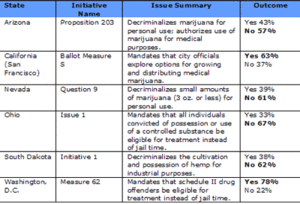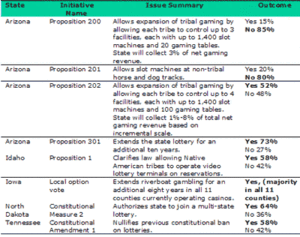The WAGER Vol. 7(48) – Gambling vs. Drugs: Public Opinion and the 2002 Elections
In addition to the issues that perennially appear on the ballot, the 2002 elections presented American voters with an unprecedented number of initiatives and referenda related to the legalization of drugs and gambling. This week The WAGER explores the implications and outcomes of these initiatives.
Despite federal government efforts to frame marijuana as a public health threat, there was enough public support for the legalization of marijuana for medicinal and recreational purposes to place initiatives on the ballot in four states. Voters throughout the country (with the exception of San Francisco), however, overwhelmingly defeated measures to legalize marijuana—showing that Americans still hold socially conservative views regarding drug use. While Washington D.C. residents voted to allow low-level drug offenders to elect treatment rather than jail time, the results presented in Table 1 indicate that the majority of Americans continue to take a hard-line stance against drugs and drug offenders.
Table 1. Election 2002 Drug Policy Ballot Initiative Examples (1)
Until relatively recently, like some patterns of drug use, gambling was considered a deviant behavior and was illegal in most states. However, on this issue the public sentiment has shifted considerably. In the face of mounting deficits, state and local politicians increasingly have turned to legalized gambling as a source of revenues, jobs, and economic development.
Legalization of gambling emerged as a key debate issue in 23 gubernatorial races this year. Further, Tennessee, Arizona, Idaho, and North Dakota voters passed initiatives to legalize, extend, or expand various forms of lottery, commercial, and Native American gambling (see Table 2). The widespread and continued acceptance of gambling was perhaps most evident in Iowa, where riverboat gambling has been in operation since 1991. Iowans residing in gaming counties voted to reauthorize legalized gambling for an additional eight year period suggesting that after a decade of cohabitation with riverboats, Iowans living in gaming communities still believe that the benefits of legalized gambling outweigh the costs.
Table 2. Election 2002 Gambling Policy Ballot Initiative Examples (2)
While gaming corporations (especially those dealing in slot and lottery technologies) will substantially benefit from these outcomes, the 2002 elections represent a setback for anti-gambling groups. But what do these election results mean for gamblers? Though exposure theory suggests that greater availability of legalized gambling might lead to increased numbers of disordered gamblers, this effect does not necessarily persist over time and a countervailing theory of adaptation might return the rate of gambling disorders to a lower level (Shaffer & Hall, 2001). Thus, while gambling facilities have dramatically increased in number over the past several decades, the prevalence of pathological gambling has remained relatively stable. It is impossible to predict with certainty whether this trend will hold as commercial gaming continues to expand.
The results of the 2002 elections demonstrate that while anti-drug sentiment continues to flourish among the American public, the nation’s attitude toward gambling has shifted. The overwhelming support for the expansion of gambling shows that Americans are increasingly willing to accept gambling as a legitimate form of entertainment, as well as a tool for economic development. In addition, this trend suggests that Americans distinguish drug involvement from gambling participation. However, for legalized gambling to be truly beneficial it must not place undue burden on the communities which it serves. For this reason, future research examining the social impact of gambling in jurisdictions served by existing and new gaming facilities will be especially important.
Comments on this article can be addressed to Tony Donato.
Notes
1. Source: Drug Policy Alliance Web site.
2. Sources: Family Research Council Web site, Arizona Secretary of State Web site.
References
Shaffer, H. J., & Hall, M. N. (2001). Updating and refining meta-analytic prevalence estimates of disordered gambling behavior in the United States and Canada. Canadian Journal of Public Health, 92(3), 168-172.

